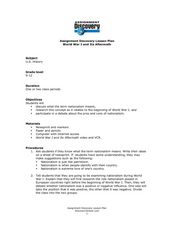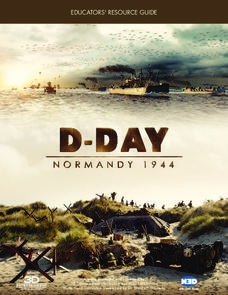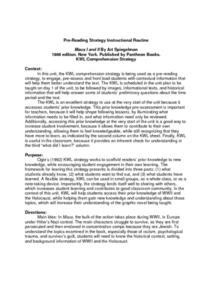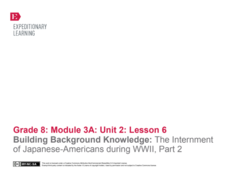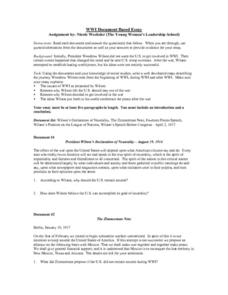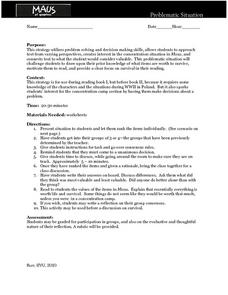Curated OER
World War I and Its Aftermath
Students examine World War I and its consequences. In this World War I lesson, students watch the Discovery video "World War I and Its Aftermath." Students then research how nationalism contributed to the spread of the war...
Curated OER
Learning From World War II and Connecting It to the Present
Compare and contrast World War II to the modern Iraq war with this instructional activity. After watching a film, learners use supporting evidence to support their point of view of the conflicts. Using the internet, they create a...
Curated OER
The Balkans and World War I
Learners review the causes of World War I and draw timelines of the 1914 events. They conduct Internet research to discover the role of the balkans in the war and how it spread to a worldwide conflict. Students then research the recent...
D-Day Normandy 1944
D-Day Normandy 1944
No study of World War II would be complete without an in-depth examination of the events of June 6, 1944. Pascal Vuong's D-Day Normandy:1944, is the perfect vehicle to convey the sheer magnitude of the events that have been called...
Curated OER
Journey to Topaz: KWHL Strategy
Japanese Internment and World war II are the focus of a KWHL strategy used to scaffold for a reading of Journey to Topaz, Yoshiko Uchida's story of 11-year-old Yuki Sakane and her family. Complete directions for the activity...
Curated OER
KWL Comprehension Strategy: Maus I and II
How much does your class know about World War II? Before reading Art Spiegelman's Maus I, lead your class in creating a KWL chart. Knowing the background and setting of the novel are extremely important in understanding this survivor's...
EngageNY
Building Background Knowledge: The Internment of Japanese-Americans during WWII, Part 2
Scholars learn about primary sources with a Primary Sources: Japanese-American Internment during World War II packet. Pupils work with a partner to read challenging sources in the packet while making notes in the margins. They then...
Teaching English
In Flanders Fields
War is one of the most profound human experiences in history, and is often best depicted in works of art and literature. Introduce class members to the poetry of World War I with this resource that uses John McCrae's "In Flanders Fields"...
Curated OER
The Enemy that Never Was
Students write speeches explaining why Japanese Canadians were not a threat to Canada during World War 2. In this Japanese Canadians lesson plan, students learn about racism, and how the Japanese were targeted but not a threat during the...
Curated OER
My Secret War: Lesson 14
Fifth graders explore the civilian role during World War II. In this social studies lesson, 5th graders write an "I Am an American" poem from the perspective of various Americans during the war.
Curated OER
Conscription Crossword
In this military service worksheet, students read 10 clues pertaining to compulsory military service in World War 2. Students fit their answers in a crossword puzzle.
PBS
WWII: Detained
Imagine being forced against your will behind barbed wire for doing nothing but being yourself. Scholars investigate the impact Japanese-American internment camps had during World War II. Through video and archival evidence, they create...
PBS
Family History: Treasure Troves
It's time for show and tell! Scholars investigate historical artifacts to determine what secrets they reveal about the time periods they represent. They then research their own personal artifacts, as well as those from World War I.
Curated OER
An English-Speaking World
An overview of the development of English as a global language fills out these slides. Beginning with statistics regarding how much of the world speaks English and to what capacity, a brief history is then given mostly pertaining to WWII...
Reed Novel Studies
Lily's Crossing: Novel Study
War affects much more than just soldiers. Lily and Albert in Lily's Crossing know that better than anyone as World War II affects both of them in different ways. Scholars use vocabulary words, answer questions, and work with literary...
Curated OER
Maus: A KWHL Approach
After reading the introduction to Maus I, class members use A KWHL approach to determine what they know, what they want to know, and where they can find information about World War II, the Holocaust, and other topics associated with Art...
Curated OER
Pre-Reading Strategy Instructional Routine: Maus I and II
Vladek's attitudes are difficult for many young learners to understand. Prepare your class for the events represented in Art Speigelman's graphic novel with a pre-reading activity that has them read articles about and interviews with...
Curated OER
Double V Campaign: Victory at Home and Victory Abroad
Students write a persuasive essay as if they were an African American in World War II and decide if they would contribute war bonds or not. In this World War II lesson plan, students study the segregation of World War II and the unity...
Curated OER
Social Effects of WWII on SC (Pt. 3)
Fifth graders examine the impact of World War II on South Carolina. In this American history lesson, 5th graders analyze primary documents that include political cartoons and advertisements that were published in South Carolina during...
Curated OER
WWI Document Based Essay
Young scholars read various primary source documents on World War I. After reading each document, they answer discussion questions. Using the internet, they identify the causes of World War I as layed out by President Wilson and his...
Curated OER
The Enemy that Never Was
Students conduct research and explain in a speech why Japanese Canadians were not a threat to Canada during the Second World War.
Curated OER
The World Of Anne Frank
Students study Anne Frank's life in hiding. In this Holocaust lesson, students read The Diary of a Young Girl by Anne Frank and then research the Internet as well as print sources to discover facts about her Holocaust experience.
Curated OER
The Canadian Campaign of the War of 1812
An article on The Canadian Campaign of the War of 1812 awaits your students. After reading the article, students answer ten true/false questions about the campaign. Answers appear at the end.
Curated OER
Maus: Problematic Situation Strategy
Do people really need “a newer, bigger Holocaust” in order to change? Or is it possible that by making text-to-self connections to the stories of others people that they can change? In order to connect to Art Spiegelman’s Maus, class...
